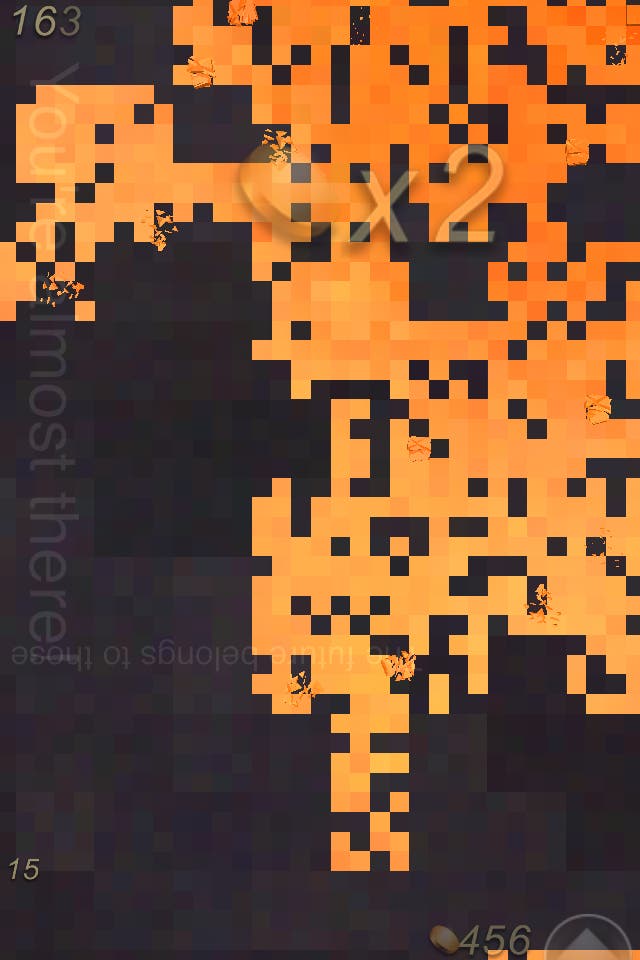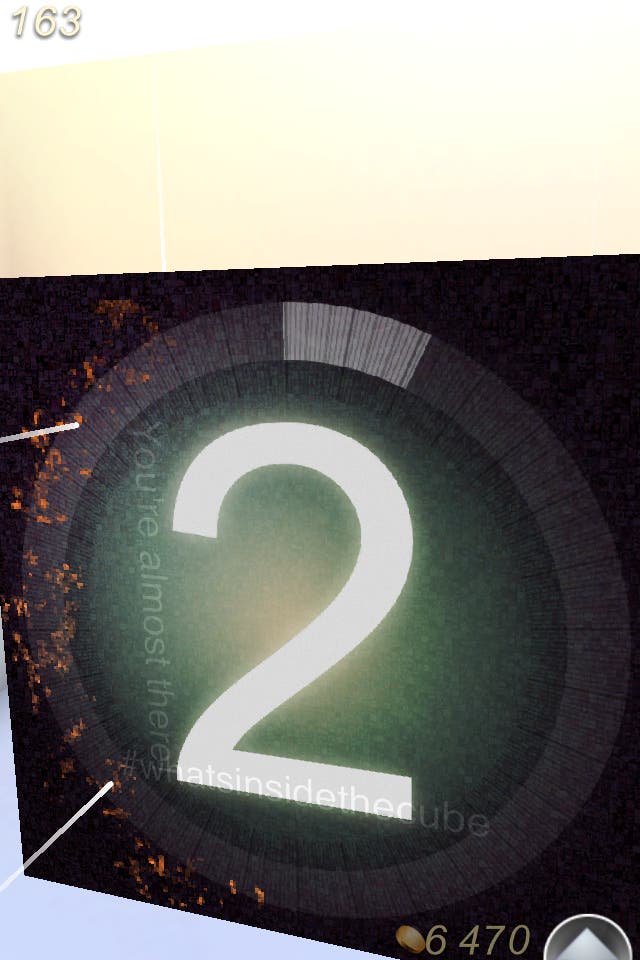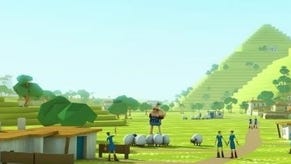Curiosity cut the crap
How Molyneux sold the angles, not the cube.
Curiosity was, its makers insist, an experiment. It ran from 6 November 2012 until May 26 2013 when Bryan Henderson, who'd downloaded the app around an hour before the close, tapped away the final cubelet and discovered what was inside the cube. A video, soon enough shared, outlining the plan for Henderson to be the presiding deity of 22Cans' next game Godus. "It is the ability to be a digital god," said Peter Molyneux. Or in other words, the prize is another promise.
This whole thing was about surfaces. And depending on your point of view Curiosity delivered. Molyneux chose his words carefully, kept the secret well, and what he said is potentially true. The prize will be life-changing if the winner gets a lot more attention and cash at some point. Everything depends, of course, on 22Cans' continuing success. There's much that's troubling about Curiosity, and that insistence on the tag 'experiment' is especially eye-pulling. There are a few reasons: it's a ready-made comeback for those who expect, horror of horrors, to enjoy playing it. 'Experiment' also implies some sort of scientific rationale behind the design, and overarching purpose. But as soon as you go into detail on Curiosity things fall apart. Like 25 billion cubelets being destroyed by the end. Originally it had 69 billion. Changed to suit the developers' needs, one presumes.

It makes you realise all of Curiosity's statistics are really deflections. Four million downloads sounds great, and then in the winner's video Molyneux mentions tens of thousands of simultaneous users as a highpoint. On that note, awfully convenient it ended up with a UK winner. In this RPS interview Nathan Grayson casually destroys Molyneux on details. This is emblematic of Curiosity's true nature: the scienciness of it, all lab coat and no trousers. Curiosity suggests something innocent - inquisitiveness for its own sake. But this could just as well have been called 'Avarice,' and with somewhat more accuracy. Curiosity was always promoted on the promise of its reward, and Molyneux even adapted the lottery's catchphrase to his own patter: "it could be you."
Curiosity inspired by the promise of reward, if you ask me, is just motivated interest. An appeal to the lazy, greedy side of our nature. I mention this because Molyneux is often thought of as an artsy dreamer, and then you think about how the game was sold, what the prize is, and comments like this: "My ambition, absolutely, is for [Henderson's cut] to be percentage points, not fractions of a percentage." Visionary.
I've written about Molyneux a lot because, of course, Curiosity and 22 Cans are so bound-up with his pronouncements. The man has a gift for making the obvious sound revolutionary, such a genius that his worst enemies work night-and-day on his behalf - look at any article on the subject and you'll find a comments section jammed with cynicism and support, indicative of huge engagement in anything he does. Molyneux could say "I'm a fish" and many would ask about the water rather than laugh.
With Curiosity he has managed to create sustained and deep interest in a basic and not very fun game. The idea was layering a simple interaction over a persistent structure; to wit, tapping away layers of a cube and seeing the efforts of those around you. It is worth pointing out that Curiosity didn't deliver exactly this experience: rather than seeing individual cubelets tapped away in a communal effort, hundreds simultaneously dissolve at intervals. Much of the rhetoric centres on the word 'connection', so it's strange it never felt like a connected experience.
"There is a line Molyneux has long since crossed where, rather than selling games anymore, he's selling himself - those wonderful ideas, the what ifs and maybes."

P.T. Barnum, the greatest showman of the 19th century, knew the difference between hyping a great product and humbug. "[The seller] must, of course, have a really good article, and one which will please his customers; anything spurious will not succeed permanently because the public is wiser than many imagine." Outright cynicism, however, doesn't seem the right response to Molyneux. He's clearly much more calculating than the bumbling front of interviews, but is this the modern Machiavelli?
I think not. Rather Molyneux is a talent that seems doomed to circle. There is a line Molyneux has long since crossed where, rather than selling games anymore, he's selling himself - those wonderful ideas, the what ifs and maybes. Molyneux has become a game developer in thrall to his image, in a situation where the execution isn't as important as the interviews and videos. It's not all bad. He can say things like "You will have the power to introduce morals into a game" and everyone knows that's not actually true but doesn't call him out. It's impossible to see Bryan Henderson's twitter background, a tiled set of pictures about how expectations don't match reality, and not think about the hand holding Curiosity's prize.
What bothers me is that it is predicated first of all on Godus being a good game, which is yet to be seen - one suspects it will be more jerry-rigged than beautifully-tuned. But look deeper and it is actually even worse than that. Curiosity's prize is fundamentally based on Godus sustaining a large and active community for a long time. Peter Molyneux has the attention span of a gadfly.
The closer you look at the whole thing, the less sturdy it all seems. How have 22Cans been developing Godus for so long without knowing this apparently key detail? You don't need to interview Molyneux to know his response to that. It's because what we're doing is so insane and, I'm being honest with you, it could end up anywhere.
Notice how Molyneux kept back the rather underwhelming detail that Henderson's prize is only for a limited time until a few days after the big reveal. Now take a look at 22Cans' website and brand new 'late believer' tier for Godus - £20 for beta access to a F2P game that's already been kickstarted. If you wanted to, you could be quite cynical about all of this.
We end on what was inside Curiosity after all: the man himself. He stands there, revealed, and makes us another promise. I'm sure that in my lifetime I will hear many more of them. In the meantime, a line from Montaigne serves as Curiosity's warning and epitaph. "It is a wonderful testimony to the weakness of man's judgement that things which are neither good nor useful it values for their rarity, novelty and, even more, their surface."








